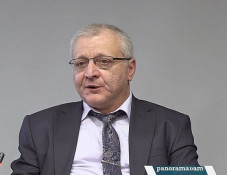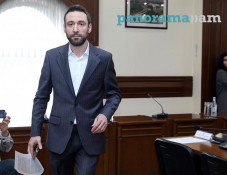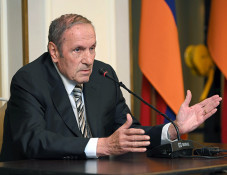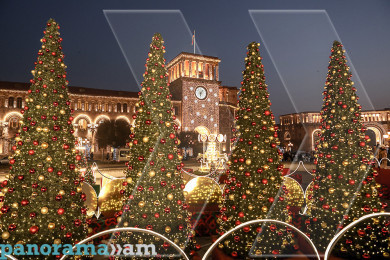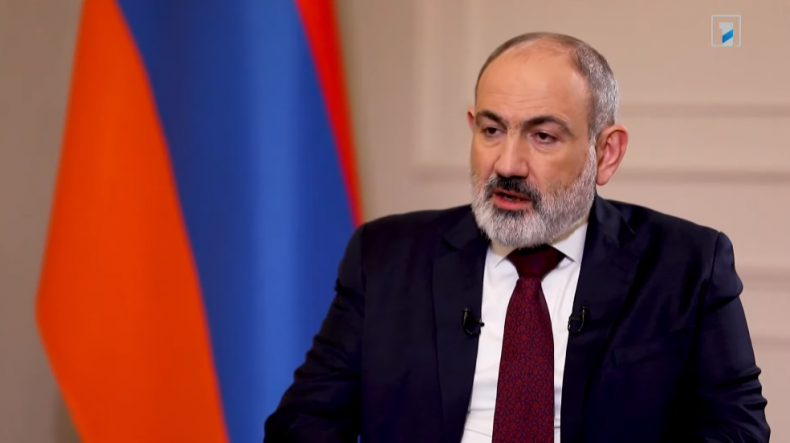
Pashinyan: Armenia has the right to have a strong and combat-ready army
Armenian Prime Minister Nikol Pashinyan sat down with The Telegraph's senior foreign correspondent Roland Oliphant for an interview on Sunday. The interview is provided below.
Roland Oliphant: Prime Minister Pashinyan, thank you for finding time to speak to us. I want to ask you something obvious, which is about the peace process with Azerbaijan. It has been five months now that the Azerbaijani forces have taken full control over Nagorno Karabakh. After that, there were discussions about peace, President Aliyev spoke about peace and his readiness to officially end the 30-year conflict, but nothing happened after that. Where are we now and why is it being delayed?
Nikol Pashinyan: First of all, it should be noted that the principles of peace between Armenia and Azerbaijan have been agreed upon in three international formats. The first took place in 2022. On October 6, during the quadrilateral meeting held in Prague, which was attended by the President of France Emmanuel Macron, the President of the European Council Charles Michel, the President of Azerbaijan Ilham Aliyev and me, and we, after long discussions, adopted a joint statement in which the following principle is recorded: Armenia and Azerbaijan recognize each other's territorial integrity based on the 1991 Declaration of Alma-Ata.
What does this mean? The Declaration of Alma-Ata is about the following and it was signed by 12 republics that were part of the Soviet Union. By signing that declaration, they recorded several things. First, the Soviet Union ceases to exist and these republics, becoming sovereign states, recognize each other's territorial integrity, inviolability of borders and sovereignty. And thus, with the Alma-Ata declaration, the existing administrative borders between the republics of the Soviet Union become state borders. I say this because it is recorded in the Alma-Ata declaration that these republics accept the existing borders, that is, whatever border existed at that moment, they recognize the inviolability of those borders.
And of course, there is a very important nuance here that I want to emphasize, the Alma-Ata declaration and the packages related to the Declaration were ratified by the Armenian parliament in 1992, the Azerbaijani parliament ratified it later. Many events took place after the signing and ratification, but in this context it is very important to record that in Prague on October 6, in the presence of the President of France and the President of the European Council, Armenia and Azerbaijan, in fact, after all those events, reaffirmed that they recognize each other's territorial integrity on the basis of the Alma-Ata Declaration.
And the second important point is that the Alma-Ata declaration should become the basis for the demarcation and delimitation of the borders between the two countries. This is also a very important principle, which in this context means that in the process of demarcation between Armenia and Azerbaijan, no border has to be created, but the borders confirmed and reaffirmed by the Alma-Ata declaration should be expressed on the ground, on maps.
This is the first fundamental agreement. After that, on October 30, the trilateral statement of the President of Russia, the President of Azerbaijan and myself was signed, in which Armenia and Azerbaijan acknowledged in a written statement that they recognize each other's territorial integrity and sovereignty and declare that they refuse to use force and the threat of force, and all issues will be resolved through negotiation. This agreement also became the basis for the formation and formulation of the third fundamental principle, which means that the opening and unblocking of regional communications, and the opening of roads for each other will take place within the framework of respect for the sovereignty and jurisdiction of countries, and this principle, together with the previous two principles, was recorded based on the results of the trilateral meetings held in Brussels on May 14 and July 15. Moreover, everything I'm talking about are public documents.
What does all this have to do with your question? And the connection is that, essentially, the architecture and principles of the peace treaty between Armenia and Azerbaijan have been agreed upon, and at the end of last year it seemed to us that we were very close to finally agreeing on the text of the final treaty, but from the beginning, Azerbaijan three times refused to participate in negotiations in different formats, after which presidential elections in Azerbaijan were scheduled. And, in fact, we are still on this point, and I assume that after the presidential elections, we will be able to achieve implementation of these points, if there is political will. I can record that the Armenian government, as before, has the political will to precisely go for peace in our region and to sign a peace treaty with Azerbaijan based on the above-mentioned agreements.
Roland Oliphant: That's quite positive, but...
Nikol Pashinyan: I apologize, but the fact that we have lost so much time is not a very positive sign, because you see, on June 1, a five-party meeting was held in Chișinău with the participation of the President of France, the Chancellor of Germany, the President of the European Council, the President of Azerbaijan and me, and where an agreement was formulated and it was published in a written form that the next meeting in that same format would take place in Granada in autumn 2023. But Azerbaijan, in fact, refused to participate in that meeting, where in that context it was formulated that the next meeting would take place at the end of October, in Brussels, in a trilateral format. Azerbaijan again refused to participate in that meeting. And if we add to this the events that took place in Nagorno Karabakh, first military strikes were carried out against Nagorno Karabakh and, in fact, Nagorno Karabakh was completely depopulated as a result of ethnic cleansing. And simply, I answered your specific question, focusing on the content of your question, but why did I interrupt your question at the point you spoke about positiveness? Because when we put these events side by side, in Armenia, for example, there are analysts who believe that all this means that Azerbaijan is retreating step by step and abandoning the agreements reached on international platforms and between us.
Roland Oliphant: Let me come back to my question. I think on January 10, President Aliyev gave a TV interview in which he said some interesting things. He said that the national project for the reclaiming of Azerbaijan's territories has been completed and he hoped that in principle there is no longer any barrier to peace. He also said that if he sees any sign of Armenia re-arming, he will launch a military action against Armenia, he reaffirmed his demand for a corridor through the territory of Armenia to Nakhichevan, he ruled out retreating of his troops from the territory inside Armenia, from strategic heights, saying that he needs these areas so that he can keep an eye on Armenian intentions. Then he rejected your proposal to draw a border based on the last Soviet military maps, stressing that he would rather talk about maps from the earlier periods of Sovietization, because Azerbaijan lost a lot of territory at that time. People, including representatives of your government, say that with this, Azerbaijan is laying the groundwork for making territorial demands from Armenia. In other words, not only Nagorno-Karabakh, but also he intends to go further and prepare, if not a large-scale invasion, then at least have claims of your territory. Is this what you think is happening?
Nikol Pashinyan: Of course, these opinions have the right to exist and these assessments cannot be considered groundless. I publicly assessed the statements made by the President of Azerbaijan in an interview given to Azerbaijani TV media at the beginning of January 2024 as a blow to the peace process, but I described a little while ago that this blow was not a standalone process and it started, firstly, with ethnic cleansing in Nagorno-Karabakh, and secondly, with the refusal to take part in the Granada meeting, continued by the rejection to participate in the Brussels meeting and the subsequent refusals to attend meetings.
I also want to note that I recently responded to those statements of the President of Azerbaijan and I need to state once again that having an army is the sovereign right of every state, and the Republic of Armenia, just like any sovereign state, has the right to have a strong and combat-ready army, with the understanding that that the Republic of Armenia is creating an army to fortify its territorial integrity and sovereignty, independence and statehood. Basically, we have shown with our political positions that we recognize the territorial integrity of all the countries of our region and we expect the same from all the countries of our region, especially given that there is a signed, adopted document regarding it. See, when I was talking about the Prague quadrilateral statement, that's exactly what the Prague quadrilateral statement is about. To talk about the territories at the time of joining the Soviet Union, you know, I think that discussions about the period of becoming part of the Soviet Union are not relevant at all in this context. Why? Because I have already said that the agreement between Armenia and Azerbaijan was recorded in writing in tripartite and quadrilateral formats, which state that the two countries recognize each other's territorial integrity on the basis of the Alma-Ata Declaration.
Newsfeed
Videos








